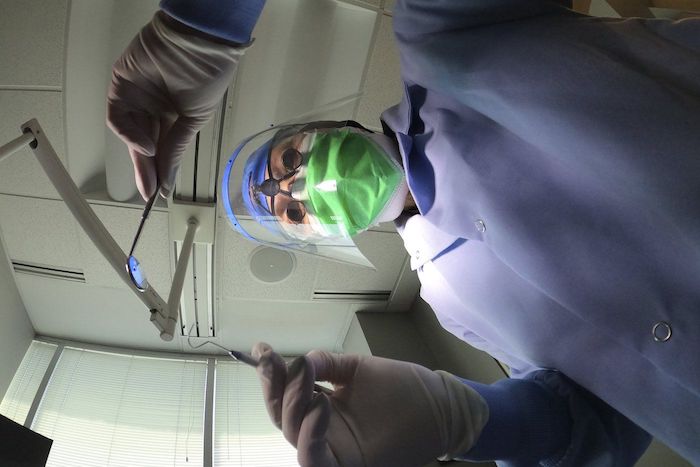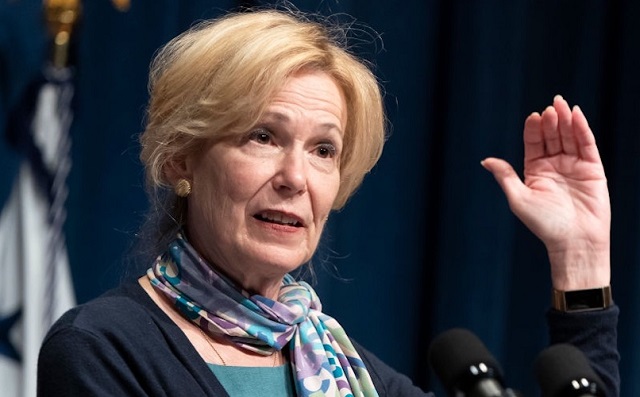Health
Canadian dentists desperate for details on federal dental care plan

News release from Canada’s Provincial and Territorial Dental Associations
Canadian dentists to MPs: We need answers about the Canadian Dental Care Plan
Lack of consultation with provincial and territorial dental associations is worrying
There are only two months left before the Canadian Dental Care Plan (CDCP) becomes available to many more Canadians. Yet more than 25,000 dentists nationwide are in the dark about how the Government of Canada will safeguard access to dental care.
In a letter sent to Members of Parliament (MPs) this week, the presidents of provincial and territorial dental associations across the country asked how the government will:
- Safeguard employer-provided dental plans that two-thirds of Canadians currently have access to?
- Ensure that a strong federal program can be coordinated with existing provincial programs?
- Protect patient choice and maintain the patient-provider relationship?
- Ensure minimal, efficient administration that promotes timely access to care?
- Respect the costs of delivering dental care to maximize provider participation?
- Increase the number of dental assistants and dental hygienists to meet the demands of the CDCP?
Dentists want to champion a CDCP that will respect patients, providers, and taxpayers. The provincial and territorial dental associations are concerned that the CDCP has been compromised by a lack of meaningful consultation with dentists – who will be expected to deliver on the government’s promises.
The CDCP is currently in final planning stages, with a potential rollout in 2024 that will attempt to increase access to uninsured Canadians under 18, people with disabilities, and seniors who have an annual family income of less than $90,000. Dentists believe all Canadians need access to dental care. If not done properly, two-thirds of Canadians who have great employer-provided dental plans could lose their coverage and be forced into a worse plan. Costs would then skyrocket, which means the $13 billion over five years the government set aside would not be enough to sustain the plan.
Let’s take the time to get it right. We can increase access to dental care right now through an expansion of the interim measure already in place – the Canada Dental Benefit. This establishes a fixed dollar amount that a patient can use to be reimbursed for dental-related expenses.
Facts:
- Canada’s provincial and territorial dental associations represent more than 25,000 licensed dentists working in more than 16,000 offices. They treat more than 30 million Canadians every year and employ at least 50,0001 oral health care workers.
- Over 60 per cent of Canadians have a dentist they visit on a regular basis.2
- A recent survey commissioned by Health Canada found that nearly nine out 10 Canadians are satisfied with the Canada Dental Benefit.3
Quotes:
“To succeed, this plan needs to work for both patients and providers, and to work in each province. What we are recommending is based on decades of experience and caring for the oral health needs of the more than 30 million people that come into our dental offices across the country every year.” — Dr. Bruce Yaholnitsky, President, Alberta Dental Association
“Poorly designed programs do not improve access to care, and they leave the most vulnerable people in society behind. This is an historic opportunity, but only if the government gets it right. Dentists have the expertise, experience, and skills to know what it takes to ensure good oral and overall health.” — Dr. Rob Wolanski, President, British Columbia Dental Association
“As dentists we are excited to be a part of this Canadian dental care program, but there are key critical issues that need to be included for this program to be successful.” — Dr. Scott Leckie, President, Manitoba Dental Association
“New Brunswick dentists are already extremely busy with the recent spike in population and the backlog in demand for services related to Covid-19. This program was intended to provide dental care to the 35 per cent of Canadians who are uninsured. It needs to be easy to understand and to administer, and to be fair to all parties, including patients, dental care providers and taxpayers. Canadians need to know what benefits are being provided and which are not, before they arrive at the dental clinic.” — Dr. Joanah Campbell, President, New Brunswick Dental Society
“The new program must be sustainable in terms of funding, and easy to understand and access. It has to be patient-centred and work for everyone.” — Dr. Shane Roberts, President, Newfoundland & Labrador Dental Association
“While the CDCP has the potential to improve the lives of many Canadians, this can only be achieved if it’s done right. To ensure the greatest possible outcome, we must consider all of the moving pieces and take a patient-centred approach.” — Dr. Juli Waterbury, President, Nova Scotia Dental Association
“The CDCP could be a game-changer for Canadians’ access to dental care. But we have one chance to get it right. Here in Ontario, we have seen that dental care programs developed without the input of dentists are doomed to fail. Just look at the Ontario Seniors Dental Care Program, where waiting lists are up to two years long in some areas, and some patients have to travel ridiculously long distances to receive treatment.” — Dr. Brock Nicolucci, President, Ontario Dental Association
“This new program has the potential to improve access to care for many Canadians. It must be sustainable, patient-centred, and easy to access for patients. A poorly designed program will not improve access to care which is something we would like to avoid. We want this to work for Canadians.” — Dr. Derek Thiessen, President, College of Dental Surgeons of Saskatchewan
Alberta
Province announces next step to revamped health care system

Setting the foundation for a refocused health system
Proposed legislation would support the refocusing of Alberta’s health care system to ensure Albertans get the care they need when and where they need it.
On Nov. 8, 2023, Alberta’s government announced plans for a refocused health care system to ensure patients are receiving the care they need, when and where they need it. To achieve this, Alberta’s government will be creating four new organizations, one for each priority health services sector: acute care, primary care, continuing care and mental health and addiction.
If passed, the Health Statutes Amendment Act would enable the government to take the necessary next steps to refocus the province’s health care system. The legislation would ensure Albertans have a system that works for them by prioritizing their need to find a primary care provider, receive urgent care without long waits, have access to the best continuing care options and obtain excellent mental health and addiction treatment.
“We are taking another step toward improving health care by updating legislation and enabling the governance and oversight required to refocus the health system. The critical improvements to transparency and accountability will help support the successful refocusing of the health care system to one that is responsive, effective and reflects the needs and priorities of Albertans today and for future generations.”
The Health Statutes Amendment Act will enable the transition from one regional health authority, Alberta Health Services, to an integrated system of four sector-based provincial health agencies including primary care, acute care, continuing care and mental health and addiction. The agencies will be responsible for delivering integrated health services, ensuring Albertans receive timely access to care, regardless of where they live.
The Health Statutes Amendment Act establishes roles for an oversight minister and sector minister. The Minister of Health will take on the role of oversight minister, responsible for setting the strategic direction of the overall health system. A sector minister will be responsible for a specific health services sector. For example, the sector minister for Recovery Alberta is the Minister of Mental Health and Addiction. On the recommendation of the oversight minister, additional health service sectors may be established and designate a minister responsible for that newly created sector.
Enhanced government oversight will help Alberta’s government to better direct resources to the front lines where they are needed the most, improve patient care overall and support health care professionals.
“Mental health and addiction have been growing issues within our society and need to be prioritized within our health care system. Amid an addiction crisis, a refocused health system will allow for mental health and addiction services to get the attention, oversight and focus they need. Recovery Alberta would allow for improved mental health and addiction care across the province as an important part of an integrated health system.”
“Refocusing Alberta’s healthcare system is a crucial step towards ensuring that we can deliver a framework that prioritizes accessibility, accountability, and patient-centered care. By streamlining operations, improving oversight and fostering collaboration, we are setting a strong foundation for a healthcare system that is better equipped to address the diverse needs of each of our communities.”
The legislation will enable the minister of health to transfer employees or classes of employees from AHS to the new sector-based organizations, once established. During the transition period, AHS will be enabled to continue operating as a regional health authority. Employee transfers will be seamless, maintaining existing bargaining relationships and collective agreements. This will ensure stability for the workforce, unions and government as the health system refocus is implemented. There will be no job losses for staff who transition into the new organizations.
Amendments to be made to existing legislation
The Health Statutes Amendment Act includes amendments to the Regional Health Authorities Act and the Health Information Act, which have not been updated since the 1990s.
As part of these amendments, the name of the Regional Health Authorities Act will change to the Provincial Health Agencies Act. The amended Provincial Health Agencies Act will remove outdated references to allow the transition from a single regional health authority to a unified, sector-specific provincial health system. This will clarify the scope and accountabilities of provincial health agencies and health service providers going forward.
The amendments will also place responsibility on the provincial health agencies for operational planning and oversight of clinical service delivery across the province. This will enable provincial health agencies to set priorities in the provision of health service delivery. The agencies will also be tasked with sharing information and collaborating closely to support seamless patient care as the transition to the refocused health care system takes place.
Alberta’s government is committed to ensuring that patient information continues to remain safe and secure through this transition. Amendments to the Health Information Act will be introduced to support the new health system refocus and to support the establishment of the Canadian Centre of Recovery Excellence. These amendments will allow the Ministry of Health, the Ministry of Mental Health and Addiction, the four new provincial health agencies, the Health Quality Council of Alberta and Canadian Centre of Recovery Excellence to have the authority to use health information for health system purposes.
If passed, the Health Statutes Amendment Act will enable Recovery Alberta, the mental health and addiction provincial health agency, to begin operating in the summer of 2024. The primary care, acute care and continuing care provincial health agencies are expected to be established in the fall.
Quick facts
- Consequential amendments are changes made to existing legislation due to new legislation being passed. These amendments are necessary to ensure legislative alignment with the proposed amendments to the Regional Health Authorities Act.
- To support the Regional Health Authorities Act amendments and ensure alignment, 43 other acts are being consequentially amended – for example, to replace references to “regional health authority” with “provincial health agency” where necessary.
- AHS will remain a key provider of health services, and in fall 2024 will transition to focusing on the provision of acute care services.
- Alberta’s government introduced the Canadian Centre of Recovery Excellence Act which, if passed, will establish the Canadian Centre of Recovery Excellence (CoRE) as a public agency that would support the Government of Alberta, including Mental Health and Addiction, and Recovery Alberta in advancing the Alberta Recovery Model.
Related information
- Establishing the future of Alberta health care
- Refocusing health care in Alberta
- Recovery Alberta
- Canadian Centre of Recovery Excellence
- Bill 22: Health Statutes Amendment Act, 2024
Related news
- Refocusing on patient-centred care (Nov. 8, 2023)
Alberta
Red Deer Hospital Lottery – Second Chance Early Bird Prize!!!

|
|
|
|
|
-

 conflict2 days ago
conflict2 days ago‘It Makes No Sense’: Experts Puzzled By Biden Admin’s Claim That Rafah Invasion Wouldn’t Help Israel Defeat Hamas
-

 COVID-192 days ago
COVID-192 days agoThe New York Times Admits Injuries from COVID-19 Shots
-

 Bruce Dowbiggin2 days ago
Bruce Dowbiggin2 days agoWhy Do The Same Few Always Get The Best Sports Scoops?
-

 Energy2 days ago
Energy2 days agoFederal government continues to reject golden opportunities to export LNG
-

 Energy2 days ago
Energy2 days agoBuckle Up for Summer Blackouts: Wind Is Already Failing Texas in Spring
-

 COVID-191 day ago
COVID-191 day agoFormer COVID coordinator Deborah Birx now admits jabs could have injured ‘thousands’
-

 Opinion1 day ago
Opinion1 day agoCanada’s fertility, marriage rates plummet to record lows: report
-

 Health13 hours ago
Health13 hours agoPrivate Footage Reveals Leading Medical Org’s Efforts To ‘Normalize’ Gender Ideology












